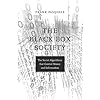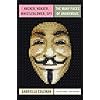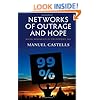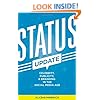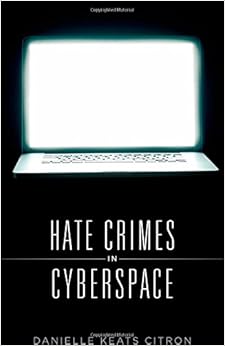
Hate Crimes in Cyberspace
and over one million other books are available for Amazon Kindle. Learn more


Flip to back
Flip to front

Hate Crimes in Cyberspace Hardcover – September 22, 2014

$22.41
FREE Shipping on orders over $35.
In Stock.
Ships from and sold by Amazon.com.
Gift-wrap available.
NO_CONTENT_IN_FEATURE
Start reading Hate Crimes in Cyberspace on your Kindle in under a minute.
Don't have a Kindle? Get your Kindle here, or download a FREE Kindle Reading App.
Don't have a Kindle? Get your Kindle here, or download a FREE Kindle Reading App.
Shop the new tech.book(store)
New! Introducing the tech.book(store), a hub for Software Developers and Architects, Networking Administrators, TPMs, and other technology professionals to find highly-rated and highly-relevant career resources. Shop books on programming and big data, or read this week's blog posts by authors and thought-leaders in the tech industry. > Shop now
New! Introducing the tech.book(store), a hub for Software Developers and Architects, Networking Administrators, TPMs, and other technology professionals to find highly-rated and highly-relevant career resources. Shop books on programming and big data, or read this week's blog posts by authors and thought-leaders in the tech industry. > Shop now
Product Details
Would you like to update product info or give feedback on images?.
|
Editorial Reviews
Review
Citron brings clarity and rigor to a difficult area of law and policy—dealing with cyber harassment and stalking—that is in desperate need of both. Her book is a must-read for anyone interested in balancing free speech and privacy, and finding protection from the damage that online trolls can do. Citron masterfully guides us toward much needed solutions.
(Emily Bazelon, Senior Editor, Slate)
[Citron’s] book comprehensively catalogs the many forms of online harassment—from revenge porn to anonymous cyber mobs—arguing that we need more robust laws to criminalize it and that law enforcement needs to take the cases more seriously… Her book attempts to persuade readers of the real damage wrought by digital attacks with examples of some of the worst harassment that’s happened online… Citron hopes her book convinces readers that harassment online should be taken seriously, and that a robust legal and enforcement framework is created to make the Internet a less chilling place for women. (Kashmir Hill Forbes 2014-08-21)
It is the first systematic account of the problem, and how to counter it. Citron proposes practical and lawful ways in which to punish online harassment and also demonstrates the emotional, professional and financial damage incurred by victims. (Katharine Quarmby Newsweek 2014-08-13)
An impassioned call for equal rights for women on the Internet…Citron introduces three women and describes how their personal, educational and professional prospects were wantonly destroyed by cybermobs attacking them through posts on social networking sites and emails sent to prospective schools and employers, messages containing scurrilous lies and graphically detailed threats to rape and murder them. Their efforts to stop or punish these activities were frustrated by the posters’ anonymity, indifference on the part of law enforcement and legal loopholes protecting the websites hosting the attacks. Central to their predicaments is a widespread attitude that considers the Internet a lawless playground with no effect on the real world and that belittles the concerns of women and minorities facing a torrent of mindless hate when they attempt to use the Internet to advance their interests and careers. Citron compares this to the dismissive attitudes about sexual harassment in the workplace and domestic violence prevalent 40 years ago, and she argues that driving this vicious behavior from the Internet should be a major 21st-century civil rights initiative. The author has given careful thought to how the standards of civilized conduct expected everywhere else in our culture can be brought to bear on the Internet consistent with First Amendment concerns and without damaging the Internet’s capacity for robust debate, activism and innovation. Along with proposals for reducing the social acceptability of Internet abuse, Citron offers well-considered and modest changes to communications law and judicial procedure that could go a long way toward opening the Internet to safer and wider use by currently victimized groups. Her suggestion that anonymity online should be treated as a privilege that can be lost by violations of a site’s terms of service is particularly constructive…Frightening and infuriating, this demand for legal accountability for Internet barbarism deserves widespread exposure and serious consideration. (Kirkus Reviews (starred review) 2014-07-13)
In this important book, Danielle Citron proposes a civil rights agenda for the digital age—new legal tools that will protect equal opportunity and human dignity in digital spaces. She explains how we can protect individuals from online harassment and abuse without undermining freedom of expression. This is pioneering legal scholarship. (Jack M. Balkin, Yale University)
The free flow of information and expression facilitated by the internet can bring out the best in people—and also the worst. Hate Crimes in Cyberspace is a call to action and a thought-provoking road map to realizing the Internet's full potential as a place of discourse and engagement for all. (Jonathan Zittrain, author of The Future of the Internet—And How to Stop It)
Citron addresses a significant, timely topic in this impressively comprehensive, expertly researched book. Drawing upon leading legal and sociological works, the author explores the nature and consequences of cyber harassment and cyber stalking. Citron’s approach is particularly effective because she introduces a series of actual cases in which victims’ lives and livelihoods have been damaged by deliberate, malicious invasions of privacy over the Internet. In addressing legal remedies for digital hate attacks, Citron invokes lessons from the civil, women’s, and employee rights movements. Moreover, she emphasizes ways in which victims can employ civil and criminal legal means of catching and punishing perpetrators of these crimes. Still, the law is dilatory in recognizing and addressing the challenges presented by digital hate; thus, law enforcement agencies and the courts have much to learn about protecting rights in the digital age…An excellent analysis of the social impact of Internet hate crimes. (Lynne Maxwell Library Journal (starred review) 2014-09-15)
About the Author
Danielle Keats Citron is the Lois K. Macht Research Professor of Law at the University of Maryland Francis King Carey School of Law.
More About the Author
Danielle Keats Citron is the Lois K. Macht Research Professor & Professor of Law at the University of Maryland Carey School of Law. Her work focuses on information privacy law, administrative law, and automated systems. Aside from writing for major law reviews, she is also a contributor to the New York Times, Slate, Time, and the Guardian. Professor Citron is an Affiliate Fellow at the Yale Information Society Project and an Affiliate Scholar at the Stanford Center on Internet and Society. She serves on the Board of Directors of the Cyber Civil Rights Initiative and is on the Advisory Boards of privacy and civil liberty organizations like Electronic Privacy Information Center, Future of Privacy, Teach Privacy, and WIthout My Consent.
Customer Reviews
5.0 out of 5 stars
| 5 star |
|
3 |
| 4 star |
|
0 |
| 3 star |
|
0 |
| 2 star |
|
0 |
| 1 star |
|
0 |
Most Helpful Customer Reviews
2 of 2 people found the following review helpful
By
Frank A. Pasquale III
on September 10, 2014
Format: Hardcover
Verified Purchase
Comment
Sending feedback...
Extraordinarily important book. It gets to the heart of very difficult conflicts between free speech and privacy, and sets an agenda for civil rights in the digital era. It is also a compelling read--once you dive in, you won't stop, as Citron is such a great storyteller.
Thank you for your feedback.
If this review is inappropriate, please let us know.
Sorry, we failed to record your vote. Please try again
By
E. Coleman
on September 16, 2014
Format: Hardcover
Comment
Sending feedback...
Excellent account that examines why and how society should regulate and respond to online hate crimes. A rich narrative that carefully considers a handful of cases, Citron leans heavily on grounded fact/accounts about the psychic and economic harm caused by hate crimes. The book goes beyond making a case that there is a problem but proposes real world solutions. For example, she identifies legal statutes that can be used to combat the problem along with recommending new policies. Most significantly, throughout the book she strikes the right balance between proposing solutions that protect civil liberties and civil rights.
Thank you for your feedback.
If this review is inappropriate, please let us know.
Sorry, we failed to record your vote. Please try again
By
Neil Richards
on September 26, 2014
Format: Hardcover
Comment
Sending feedback...
In this beautifully-written book, Danielle Citron explains how hate continues to be a problem on the Internet, and how we should respond. Its clear prose and sensible argument make this one of the most important books about the Internet written this decade.
Thank you for your feedback.
If this review is inappropriate, please let us know.
Sorry, we failed to record your vote. Please try again

